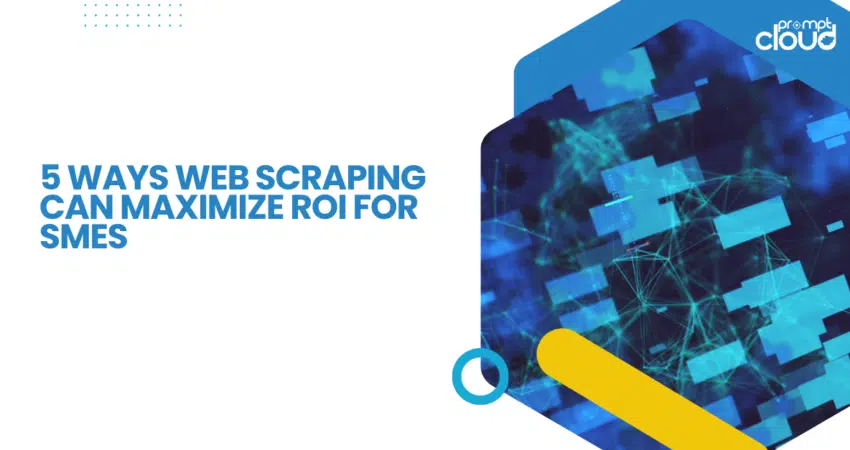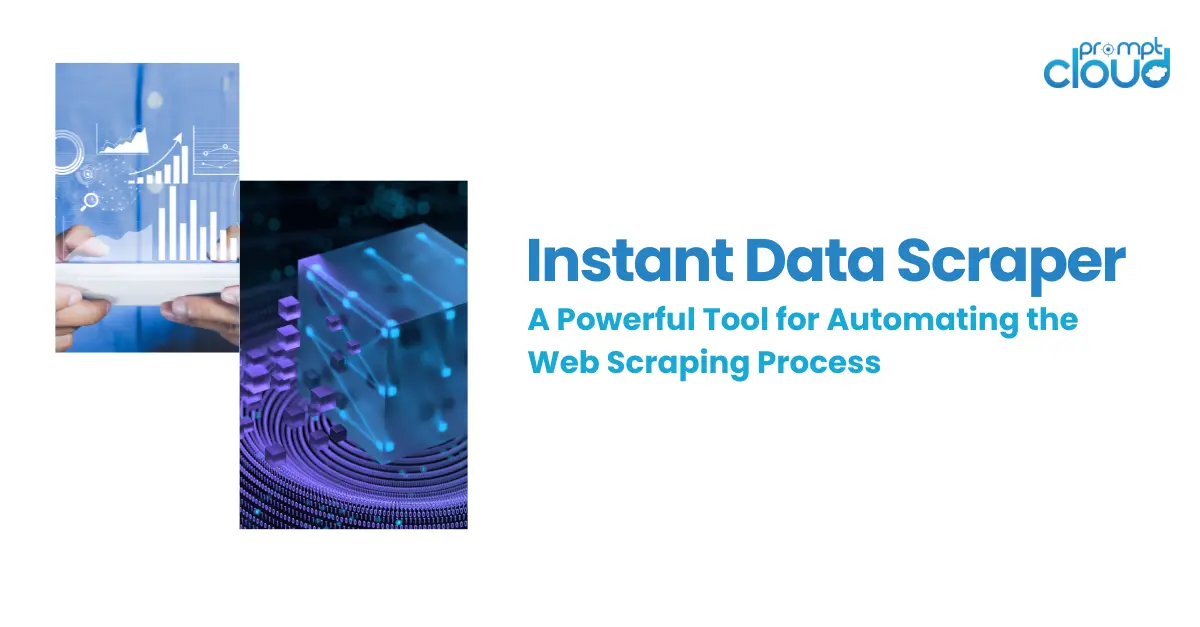
Web scraping, employing software to extract data from websites, has completely transformed data-driven methodologies. For small businesses, it represents a potent arsenal for acquiring competitive intelligence. Through it, enterprises can monitor market dynamics, grasp customer sentiments, and pivot rapidly, fostering astute decision-making. The adept aggregation of data facilitates the fine-tuning of marketing initiatives, the discovery of fresh prospects, and the optimization of pricing tactics. Consequently, web scraping tools equips small and medium-sized enterprises (SMEs) with valuable insights that are usually exclusive to large corporations, thereby leveling the playing field in the digital arena.
Explaining Web Scraping: Its Definition and Functioning
Web scraping entails the extraction of data from websites. This method facilitates the automated gathering of extensive information from web pages, subsequently available for processing, analysis, or storage for future utilization. The procedure operates as follows:
- Bot Identification: A web scraping tool, often denoted as a bot or spider, discerns the target website or pages.
- Scooping Up Data: The bot navigates adeptly through the website, judiciously gathering the specific data requisite.
- Extracting Info: It accumulates an array of elements, encompassing text and images, from the site.
- Sorting Things Out: The amassed data undergoes meticulous organization into a structured format conducive to facile analysis or archival.
- Storing It Away: Subsequently, the structured data is securely archived in a database or file for future reference.
Web scraping tools manifest in diverse manifestations, ranging from rudimentary solutions for ad hoc tasks to sophisticated systems proficient in handling extensive operations across myriad websites.
Cost-Effectiveness: Maximizing Budgets with Automated Data Collection
In the competitive landscape of small and medium-sized enterprises (SMEs), web scraping stands out as a beacon for cost-effectiveness. Automated data collection enables these businesses to gather large volumes of data without the need for extensive manual labor, thereby reducing overhead costs. The precision inherent in web scraping tool significantly mitigates errors, further reducing any ancillary costs associated with data rectification.
By embracing automation, SMEs gain the ability to dynamically monitor market fluctuations and competitor pricing in real-time, facilitating swift strategic adaptations without incurring exorbitant market research expenditures. Consequently, SMEs can allocate their limited resources more judiciously, directing funds towards expansion and innovation rather than being bogged down by data management tasks.
Gaining a Competitive Edge: Market Analysis with Data Insights
- Web scraping empowers SMEs to conduct thorough market analysis by gathering extensive data from diverse online sources. By delving into this data, businesses can:
- Spot emerging market trends and discern consumer preferences.
- Track competitors’ pricing strategies and product lineups.
- Grasp the dynamics of market demand and supply.
- Benchmark against industry standards and best practices.
Through these data insights, SMEs can make informed strategic decisions, tailor their product development, optimize pricing, and refine marketing strategies to maintain a competitive edge.
Time Management: How Web Scraping Tool Saves Hours of Manual Research
Time is a valuable asset for small and medium-sized enterprises (SMEs), where often the workforce is limited and every hour counts. Web scraping is an invaluable tool for managing time efficiently because:
- Automates Data Collection: Manual research involves time-consuming tasks such as visiting multiple web pages and copying information. Web scraping automates this process, gathering large volumes of data in minutes.
- Scheduled Scraping: Web scrapers can be scheduled to run at regular intervals, ensuring the latest data is always at hand without any manual intervention.
- Data Accuracy and Relevance: By using web scraping, SMEs are ensured accurate and relevant data, reducing the time needed for data verification and cross-checking.
- Quick Decision Making: Speedy access to critical data through scraping enables fast decision-making, a key competitive advantage in the fast-paced business environment.
- Integrates with Analytical Tools: Scrapped data can be directly fed into analytical tools, facilitating immediate analysis and avoiding the manual transfer of data from one system to another.
Employing web scraping, SMEs can free up countless hours that would otherwise be spent on manual research, allowing them to focus on core business strategies and operations.
Customized Data Gathering: Tailoring Data to Specific Needs
Web scraping enables SMEs to gather customized data tailored to their specific business goals. By targeting industry-specific platforms, monitoring competitor pricing, and obtaining niche market trends, businesses can gather precise information for informed strategic planning.
Web Scraping to Amplify Sales Opportunities
Web scraping is instrumental for SMEs in refining lead generation strategies. By extracting vast quantities of targeted data from the web, businesses can:
- Understand market trends and customer preferences.
- Tailor marketing campaigns to specific demographics.
- Monitor competitor customer bases for opportunities.
- Enhance CRM with up-to-date and relevant data.
These tactics ensure SMEs not only increase the quantity of leads but also improve the quality, substantially raising the likelihood of converting prospects into loyal customers and amplifying sales opportunities.
Real-Time Data Access: Making Timely Business Decisions
In today’s fast-paced market, Small and Medium-sized Enterprises (SMEs) must make swift, informed decisions. Web scraping enables SMEs to gain real-time access to vital data across various markets and competitors. This immediate data retrieval allows businesses to:
- Leverage up-to-the-minute pricing for competitive strategy adjustments.
- Monitor consumer sentiment and adjust marketing campaigns accordingly.
- Identify and act upon emerging trends before they become mainstream.
- Optimize inventory levels based on current market demands.
- Ensure compliance with regulatory changes as they happen.
Empowered with real-time data, SMEs can make agile decisions that enhance operational efficiency and drive a more significant return on investment (ROI).
Enhancing SEO Strategies: Using Web Scraping to Improve Online Visibility
Web scraping tool can significantly boost SEO efforts by allowing businesses to gather and analyze competitor data, including keywords and backlinks. By extracting insights from competitors’ websites, SMEs can:
- Identify high-performing keywords not yet targeted, potentially driving more traffic to their site.
- Discover backlinks and networking opportunities that could enhance their backlink profile.
- Monitor competitor content strategies and adapt their content to fill gaps in the market.
- Analyze search result ranking factors to better understand the algorithm updates and user intent.
With these actionable data points, businesses can refine their SEO strategies and improve their online visibility, driving more organic traffic and elevating their presence in search engine results.
Monitoring Brand Reputation: How Web Scraping Can Protect Your Brand
In today’s hyper-connected world, a brand’s reputation can fluctuate rapidly. Web scraping empowers Small and Medium-sized Enterprises (SMEs) to track their brand’s online presence effectively. By extracting data from various sources such as social media, forums, review sites, and news outlets, businesses can:
- Gain immediate insights into customer sentiment and feedback.
- Identify and address potential PR crises early by monitoring negative mentions.
- Analyze competitor reputation strategies to adapt and stay competitive.
- Track brand mentions over time to assess the impact of marketing campaigns.
- Leverage customer testimonials and positive reviews in promotional materials.
By continuously monitoring the digital landscape, web scraping helps SMEs safeguard their brand reputation, ensuring they can react swiftly and strategically to protect their image.
Automated data collection processes reduce human error
- Ensuring that the information remains up-to-date with regular updates.
- Implementing data validation techniques to ensure the consistency of scraped data.
- Utilizing advanced algorithms to filter out any inaccurate or irrelevant data.
- Application of machine learning to enhance the scraping process continually.
- Prioritizing data integrity enables SMEs to base strategies on reliable information, leading to better business outcomes.
Integrating Web Scraping into Your Business Growth Strategy
In summary, the integration of web scraping into your business growth blueprint confers upon SMEs a distinct competitive edge. By harnessing data to discern market trends, and customer behaviors, fine-tune pricing structures, and vigilantly monitor competitors, enterprises can craft astute decisions that propel profitability. Prioritizing compliance with legal and ethical norms remains paramount in harnessing this technological tool. Ultimately, web scraping emerges as an indispensable resource for SMEs striving to maximize returns on investment through meticulous analysis and strategic acumen.



















